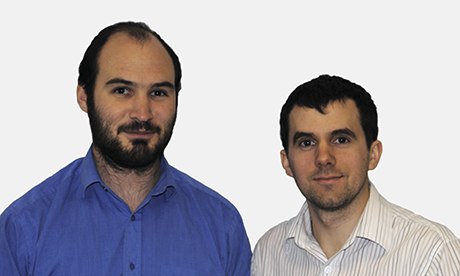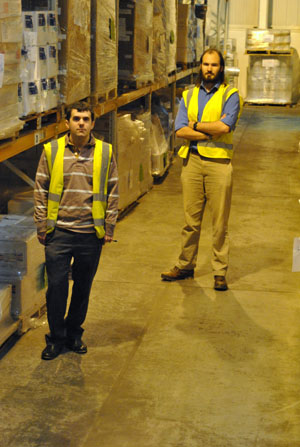 MEET James Strachan and James Hyde: The start of the new decade ushered great change into the lives of two men, both named James. This change was the launching of James and James e-Commerce Fulfillment, a firm that started in 2010. Of the two founders, it’s James Hyde who’s the operational planner. A lion’s share of his involves helping companies to put business processes in place to increase efficiency and productivity. His business partner, James Strachan, is a programmer at heart. He has helped companies design robust processes, using a heady combination of web software and common sense. As a combined force, the two are manufacturing engineers by trade. They studied together at the Institute for Manufacturing in Cambridge, and share their insights and knowledge in the following interview.
MEET James Strachan and James Hyde: The start of the new decade ushered great change into the lives of two men, both named James. This change was the launching of James and James e-Commerce Fulfillment, a firm that started in 2010. Of the two founders, it’s James Hyde who’s the operational planner. A lion’s share of his involves helping companies to put business processes in place to increase efficiency and productivity. His business partner, James Strachan, is a programmer at heart. He has helped companies design robust processes, using a heady combination of web software and common sense. As a combined force, the two are manufacturing engineers by trade. They studied together at the Institute for Manufacturing in Cambridge, and share their insights and knowledge in the following interview.
WMI: What inspired you to create James and James e-Commerce Fulfillment?
JH: It was a classic case of finding a market need. We were doing some consulting and our client’s fulfilment provider was terrible. We went looking for a better fulfilment provider, couldn’t find one, and so we started our own fulfilment business.
WMI: Give us a brief overview of what your firm does.
JH: We provide an outsourced order fulfilment service – we store, pick and despatch online goods for retailers. For many, we remove all of their logistical and fulfilment problems so they can get on with selling – after all, that’s what retailers are good at!
WMI: What differentiates your fulfillment firm from other fulfillment companies?
JS: Our company is a response to the increasing sophistication of selling online, not a repurposing of old warehouse methodologies. As such, we developed our own cloud-based fulfilment software to integrate seamlessly with ecommerce platforms. It runs every process within our fulfilment center and because it’s entirely online our clients can see the status and history of all their orders and inventory in real time.
WMI: What do you mean when you say that the future of e-commerce is reliant on fulfillment innovation? 
JH: Fulfilment will certainly be key to how the physical side of e-commerce evolves. Consumers are expecting goods delivered sooner and they want more flexibility, all with a reducing average order value. The current methods of fulfilment and delivery currently don’t meet this increasing expectation so something has to change.
WMI: In what specific ways is cloud impacting the courier business?
JS: If by ‘courier business’ you mean the carrier networks from Royal Mail to FedEx then we’re not directly involved so don’t really know the impact it’s having. If there are effects they’re not visible from the outside – the couriers’ systems are quite antiquated in our experience.
WMI: This isn’t your first business. What were some of the other companies you owned and managed and what did you learn from those failures or transitions?
JH: Not to get too involved. To manage a business well you need to keep focus on the planning and not get too tied down to the doing. That’s hard in a very small business, but it’s important for growth.
WMI: Which is most important, understanding the industry your business operates in or understanding your business? Why?
JS: I’m not sure you can place one above the other. Without knowledge of the specific customer requirements in an industry you can’t hope to build the right offering; without a deep understanding of what you’re doing, you’ll struggle to sell your product to anyone. I’d say if you only have industry understanding you’re a consultant and if you only have introspective understanding you’re just doing some weird modern art thing.
WMI: A lot has been said about start-up funding. Where did you find the funding to get James and James off the ground?
JH: It was pretty much self funded and by that I mean it wasn’t funded. We borrowed a lot of equipment, bought some PCs from gumtree and managed to convince someone to rent out a corner of their warehouse. A lot has changed now, but it proves that all you really need to start a business is determination.
JS: We launched with one client, who had a real fulfilment need that we specifically addressed. By keeping our overheads low, their business covered the expense of organic growth. It’s a really nice way to start a company as we retain control of our vision but continually have to prove our worth to the market.
WMI: What has been the toughest thing to learn about owning a business?
JH: I think the hardest learning is that if something goes wrong, it’s always your fault. As a director, it’s your job to make sure everyone understands their role and you’ve put in place the right methods of training and created the right culture. If a member of staff makes a mistake, it’s easy to blame them, but ultimately you should have done a better job yourself.
WMI: What has been the most rewarding part of owning a business?
JS: It’s never boring! With the growth we continue to enjoy we are constantly doing different work as the needs of the business scale and change. While we’re always chasing our future plans, there’s a certain satisfaction in reflecting on how the business has grown to this point and the excellent staff and customers we have picked up on the way.
WMI: Social media networks, press releases, interviews, etc. provide a myriad of marketing opportunities. Share three to four specific marketing strategies/action steps you have found to be most effective at getting you exposure for your business. 
JH: 1. Do something different. That’s getting harder and harder to do these days, but I think people are tiring of a lot of traditional marketing.
2. Work out your brand before you start marketing it. We went through a long process of re-branding the company last year and it really made us think about what makes us different in the market.
JS: 3. Write about something interesting. It’s often said content is king but there’s all too often a push for quantity over quality. We frequently find that fulfilment-specific things that we take for granted are actually of general interest if you take the time to explain them.
WMI: To keep your business going, you have to generate cash inflow. Tell us about two to three effective cash inflow strategies you’ve found effective.
JH: 1. Do something that makes a profit. I know that’s obvious, but retained profit is the best type of cash generation there is!
2. We had a few issues with late payment. That can affect cash flow, but it’s also a waste of resources chasing payments. Someone suggested we moved to Direct Debit and it has been a great success. All our fulfilment clients now pay on time.
WMI: Do you work with international clients or do you mainly provide services to clients based in the UK?
JH: We work with a lot of international clients. The largest markets for us at present are the USA, Scandanvia and Central Europe, where retailers are looking to fulfil orders in to the UK and Western European markets.
WMI: Who inspired you to go after your dreams when you were children? How is this person still positively impacting your lives today?
JS: I liked Pat Sharp’s can-do attitude.
JH: Me too.
JS: Yeah, he was cool.
WMI: What’s next for both of you? Where do you see yourselves and your business three to five years from now?
JH: We’ve still got a lot we can offer this industry, and it’s one that is seeing some major changes too, so I’m confident we won’t be looking at other ventures just yet. It is an international market though, so taking our technology overseas is certainly on the roadmap.
JS: The eCommerce market’s growing and developing apace, chasing it is far too interesting to be looking for other projects. We’re only a short distance down our long path to bringing web technologies right into the nuts and bolts of order fulfilment; there’s much more to do.




You must be logged in to post a comment.